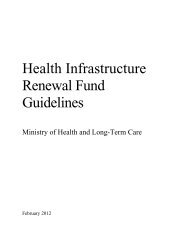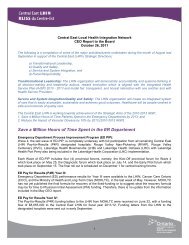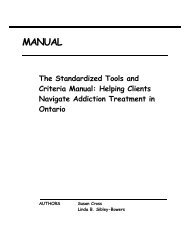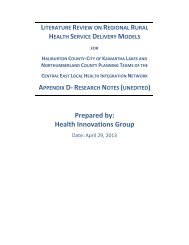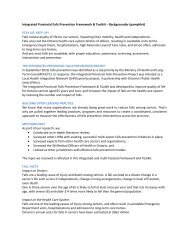CDE Appendix 1 Literature Review - Central East Local Health ...
CDE Appendix 1 Literature Review - Central East Local Health ...
CDE Appendix 1 Literature Review - Central East Local Health ...
Create successful ePaper yourself
Turn your PDF publications into a flip-book with our unique Google optimized e-Paper software.
The Culture, Diversity and Equity Project: <strong>Literature</strong> <strong>Review</strong><br />
by those operating within their respective purviews. <strong>Health</strong> equity and healthcare equity frameworks, nonetheless,<br />
need not be, and should not be seen, as necessarily mutually exclusive.<br />
The diagram below depicts two different genealogies of approaches tackling inequities in health and social services,<br />
and recent attempts to bridge these two approaches in healthcare (see Janzen & Ochocka, 2006 for more on the<br />
genealogy and synthesis of these approaches).<br />
The distinction drawn between power-oriented and culture-oriented approaches maps partially onto the distinction<br />
drawn in this review between health equity and healthcare equity (cultural competence in specific) approaches.<br />
Figure 2.1: Contending diagnoses of the sources of inequitable healthcare service<br />
Source: Janzen & Ochocka, 2006.<br />
<strong>Health</strong> Equity approaches are generally more power-oriented, focusing much more directly on structural inequities<br />
in power in society as these impact upon health status among disadvantaged population groups. Margot Lettner’s<br />
(2008a) analysis of the roots of health inequity is exemplary of this power-oriented approach. As she argues:<br />
The clear research consensus is that the roots of health disparities lie in broader social and economic<br />
inequality and exclusion. The most effective conceptual framework for health disparities is therefore<br />
grounded in a determinants of health approach, i.e., it looks beyond the traditional definitions of health, as<br />
well as beyond the historical analyses of the causes of illness and injury, and focuses on a broad range of<br />
socio-economic influences and outcomes that affect both individual and community or population health,<br />
such as income/wealth distribution and poverty, early child development, education, employment and<br />
working conditions, housing, gender, race and ethnicity, citizenship and immigration status, language,<br />
ability, sexual orientation, age, racism and discrimination, social exclusion, and natural and built<br />
environments.<br />
Most researchers and policy-makers working within a health determinant, health equity framework, nevertheless,<br />
also recognize the important, albeit less determining role, of healthcare services in mitigating the effects of health<br />
inequities (healthcare itself being one determinant of health among others).<br />
<br />
17



